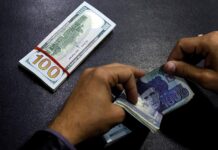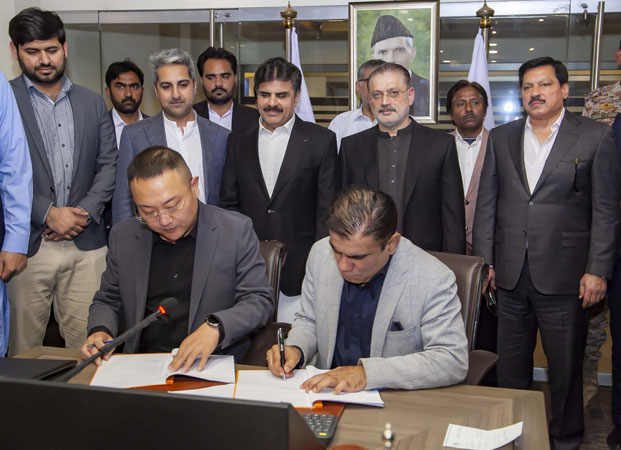KARACHI: Chinese and Pakistani diplomats signed memorandums of understanding (MoUs) for five major projects in transport, health, energy, and agriculture with the support of the Sindh government.
The agreements include initiatives for the local assembly of electric cars, manufacturing of solar panels, production of slow-release fertilizers, algae farming, and the establishment of a medical city in the Dhabeji Special Economic Zone.
The signing ceremony was hosted by Sindh Energy Minister Syed Nasir Hussain Shah at his office and attended by Sindh Senior Minister Sharjeel Inam Memon and Special Assistant to the Chief Minister Syed Qasim Naveed Qamar.
Chinese investors expressed significant interest during their visit to Sindh, which included meetings with Sindh Chief Minister Syed Murad Ali Shah and former President Asif Ali Zardari. The Chinese ambassador to Pakistan was also present during these discussions.
Former President Zardari assured the Chinese delegation of full support from both federal and provincial governments for their investments in Pakistan. Minister Sharjeel Inam Memon highlighted the longstanding and exemplary friendship between China and Pakistan, noting its foundation was laid by Shaheed Zulfikar Ali Bhutto.
He recalled that during the Pakistan Peoples Party’s government in 2008, President Zardari initiated the China-Pakistan Economic Corridor (CPEC) project, envisioning it as a tool to enhance bilateral ties and boost Pakistan’s economy.
Memon emphasized that Sindh has played a pivotal role in Pakistan’s success in global Public-Private Partnership rankings, as the province has executed several major projects under this model. He noted the province’s ability to attract investments for mega-initiatives, many of which are currently operational and contributing to the economy.
During the event, Memon announced that Chinese investors have expressed a keen interest in establishing a state-of-the-art medical city in Pakistan. This facility, to be located in the Dhabeji Special Economic Zone, is expected to create 50,000 jobs.
The Sindh government has assured its full support for the medical city, which would include tax exemptions and incentives to attract investors.
Memon also highlighted plans to introduce electric vehicle (EV) taxis under a government initiative aimed at creating job opportunities for youth. This scheme, initiated on the directives of PPP Chairman Bilawal Bhutto Zardari and former President Zardari, will also help reduce emissions and provide affordable transport options.
Special Assistant to the Chief Minister, Syed Qasim Naveed Qamar, emphasized the potential for local value addition in natural resources. He criticized the current practice of exporting unprocessed granite, which is later sold back in Pakistan after processing. He committed to efforts to ensure local granite processing to maximize economic benefits.
Minister Memon further highlighted the vast coal reserves in the Thar region, estimated to be in the tens of billions of tons, capable of producing affordable electricity for several centuries. These resources, he said, would play a significant role in addressing Pakistan’s energy deficit. He announced plans for a coal gasification plant on 200 acres of land, alongside solar parks to diversify the province’s energy mix.
Sindh Energy Minister Nasir Hussain Shah underscored the government’s efforts to ensure affordable electricity for the public. He revealed plans to set electricity rates at Rs18 per unit for solar energy produced by the upcoming solar parks, with regulatory oversight provided by the Sindh Energy Power Regulatory Authority (SEPRA) and Sindh Transmission and Distribution Company (STDC).
Shah also highlighted Sindh’s lack of representation in K-Electric, despite the presence of three federal representatives, which limits the province’s say in decisions regarding load-shedding and tariff structures. He reiterated the Sindh government’s vision, aligned with Chairman Bilawal Bhutto Zardari, to make cheap electricity accessible to the public.
The Dhabeji Special Economic Zone remains central to Sindh’s investment strategy, as it is the only zone directly connected to CPEC. The government offers a ten-year tax exemption for industries established in the zone, aiming to attract both local and international investors.
The agreements signed during the event are expected to strengthen ties between Pakistani and Chinese businesses, enabling technology and business model exchange while contributing to Pakistan’s economic growth.
























